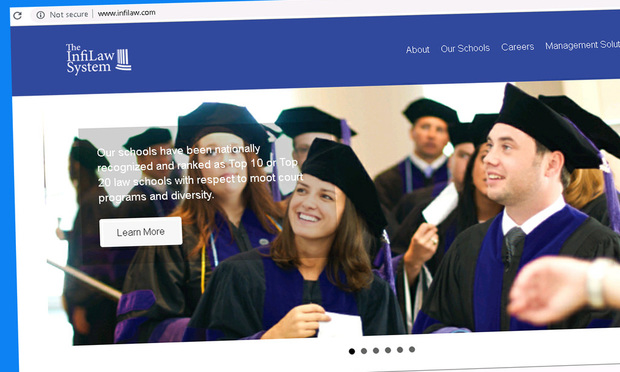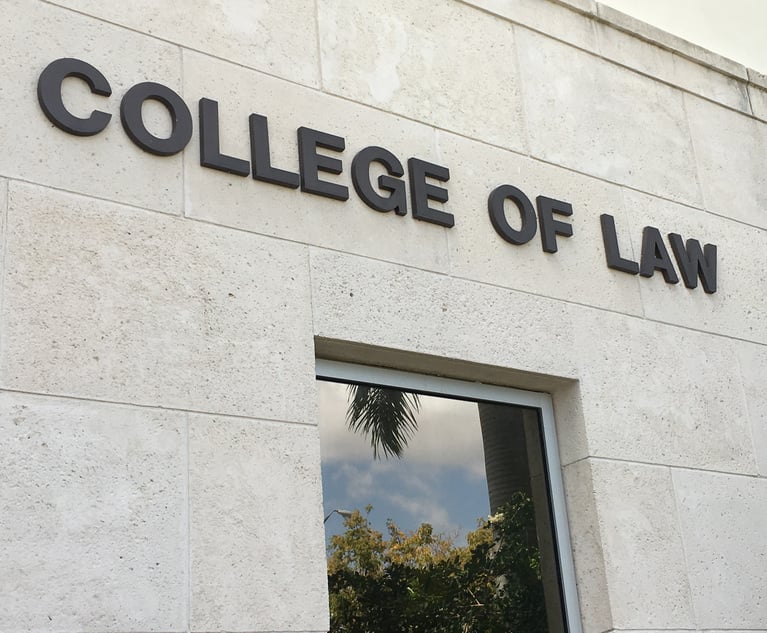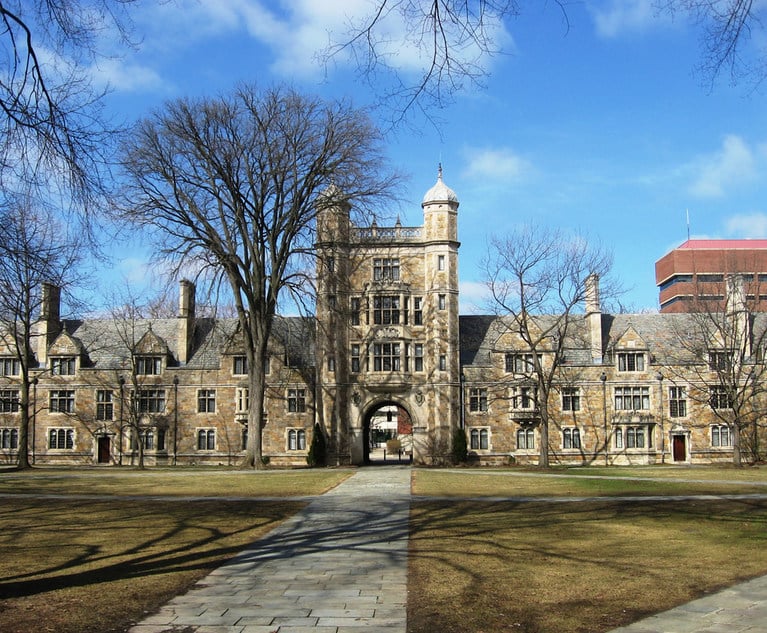Judge Tosses Another Whistleblower Suit Against For-Profit Law School Chain
Allegations that InfiLaw Corp.'s law schools skirted federal student loan rules and deceived students are too vague to move forward in court, a federal judge has ruled.
August 13, 2019 at 01:29 PM
5 minute read
 Screenshot of The InfiLaw System’s website.
Screenshot of The InfiLaw System’s website.
For-profit law school operator InfiLaw Corp. has dodged a third whistleblower lawsuit claiming it defrauded the federal government and deceived students.
A federal judge in Florida on Monday dismissed a qui tam suit brought by two former employees of the now-closed Arizona Summit Law School that claimed, among other things, that InfiLaw administrators conspired with bar preparation outfit BarBri to make sure that the Phoenix law school was in compliance with a rule that no more than 90% of it funds were derived from federal student loans.
In a 58-page opinion, U.S. District Judge Marcia Morales Howard of the Middle District of Florida ruled that many of the plaintiffs’ claims of wrongdoing by InfiLaw and its three law schools were barred in court because they had already been disclosed in the media through articles and blog posts critical of the schools’ practices. Moreover, Howard found the allegations brought by Paula Lorona and Reid Potter to be too vague to overcome the defendants’ motions to dismiss.
“Whether the law schools published substantially misleading information regarding its bar passage rates depends entirely on what was said, when it was said, in what context, what was or was not disclosed about the Unlock Potential program, and the impact the program did or did not have on the bar passage statistics,” Howard wrote of an InfiLaw program in which the schools provided stipends to students who agreed to delay taking the bar exam for fear they would not pass. “None of this information is alleged in the third amended complaint.”
David Mills, a partner with Cooley who represented InfiLaw, did not respond to requests for comment on the decision Tuesday. Nor did Robert Mills, an attorney with the Phoenix firm Mills and Woods Law who represented the plaintiffs.
InfiLaw has prevailed in each of three whistleblower suits brought by former employees in recent years. Former Arizona Summit law professors Celia Rumann and Michael O’Connor, who were fired, voluntarily dismissed their qui tam suit in February 2018 after the government declined to intervene. And in November, another federal judge in Florida tossed former Charlotte School of Law professor Barbara Bernier’s whistleblower suit, also finding that her claims were too vague and too similar to the two previously filed suits. (The government also passed on joining Bernier’s suit.)
Arizona Summit closed in the fall of 2018, while Charlotte School of Law shuttered in the fall of 2017. InfiLaw’s remaining law school, Florida Coastal School of Law, is in the process of becoming an independent, nonprofit campus.
All three whistleblower suits included allegations that the InfiLaw campuses defrauded the federal government by admitting unqualified students in a bid collect their student loans. They also claim that the school’s violated the so-called 90/10 rule, which requires higher education institutions to derive no more than 90% of their revenue from federal student loans.
Lorona, a former Arizona Summit student and employee in its financial aid office, initially filed suit against Arizona Summit in 2015. Reid, another former student and employee in the bar preparation program at Arizona Summit, joined the suit the following year. But the U.S. government declined to intervene in February of 2018 and the plaintiffs pushed forward without it.
Among their myriad allegations is that InfiLaw school administrators devised an in-house bar preparation program in 2011 as a means to skirt the government’s 90/10 rule because they feared their reliance on federal loans would soon exceed that threshold. They claim that Arizona Summit partnered with BarBri to execute the program, but that students would pay the cost directly to Arizona Summit instead of BarBri. The school would then count that bar prep revenue towards the 10% of funds coming from outside the federal student loan program, the suit alleged. But the claims are too vague and do not assert that Arizona Summit actually crossed that 90% threshold, Howard wrote. Moreover, the revenue the plaintiffs claim was derived from the bar prep scheme is nowhere near enough to represent 10% of the Phoenix school’s revenue, the opinion says.
“[Plaintiffs] contend that the law schools were defrauding the federal government of student loan funds because they were engaged in conduct which rendered them ineligible to participate in the federal student loan programs,” Howard wrote. “However, the public disclosures exposed the very conduct which [plaintiffs] contend was disqualifying, namely, the Law Schools’ practice of admitting unqualified students, the likely inability of those students to pass the bar exam, the high cost of the Infilaw education, and the implications of Infilaw’s admissions practices with respect to the Law Schools’ bar passage rates and accreditation.”
This content has been archived. It is available through our partners, LexisNexis® and Bloomberg Law.
To view this content, please continue to their sites.
Not a Lexis Subscriber?
Subscribe Now
Not a Bloomberg Law Subscriber?
Subscribe Now
NOT FOR REPRINT
© 2025 ALM Global, LLC, All Rights Reserved. Request academic re-use from www.copyright.com. All other uses, submit a request to [email protected]. For more information visit Asset & Logo Licensing.
You Might Like
View All
Florida Law Schools Are Seeing a Bump in Applications for 2025, After Recent Declines at Flagship Schools
3 minute read

Law School Applications are Up Across the Country. Law Deans Aren't Sure Why
6 minute read
Librarian's Termination Violated First Amendment Protections, Lawsuit Claims
3 minute readTrending Stories
- 1How Alzheimer’s and Other Cognitive Diseases Affect Guardianship, POAs and Estate Planning
- 2How Lower Courts Are Interpreting Justices' Decision in 'Muldrow v. City of St. Louis'
- 3Phantom Income/Retained Earnings and the Potential for Inflated Support
- 4Should a Financially Dependent Child Who Rejects One Parent Still Be Emancipated?
- 5Advising Clients on Special Needs Trusts
Who Got The Work
J. Brugh Lower of Gibbons has entered an appearance for industrial equipment supplier Devco Corporation in a pending trademark infringement lawsuit. The suit, accusing the defendant of selling knock-off Graco products, was filed Dec. 18 in New Jersey District Court by Rivkin Radler on behalf of Graco Inc. and Graco Minnesota. The case, assigned to U.S. District Judge Zahid N. Quraishi, is 3:24-cv-11294, Graco Inc. et al v. Devco Corporation.
Who Got The Work
Rebecca Maller-Stein and Kent A. Yalowitz of Arnold & Porter Kaye Scholer have entered their appearances for Hanaco Venture Capital and its executives, Lior Prosor and David Frankel, in a pending securities lawsuit. The action, filed on Dec. 24 in New York Southern District Court by Zell, Aron & Co. on behalf of Goldeneye Advisors, accuses the defendants of negligently and fraudulently managing the plaintiff's $1 million investment. The case, assigned to U.S. District Judge Vernon S. Broderick, is 1:24-cv-09918, Goldeneye Advisors, LLC v. Hanaco Venture Capital, Ltd. et al.
Who Got The Work
Attorneys from A&O Shearman has stepped in as defense counsel for Toronto-Dominion Bank and other defendants in a pending securities class action. The suit, filed Dec. 11 in New York Southern District Court by Bleichmar Fonti & Auld, accuses the defendants of concealing the bank's 'pervasive' deficiencies in regards to its compliance with the Bank Secrecy Act and the quality of its anti-money laundering controls. The case, assigned to U.S. District Judge Arun Subramanian, is 1:24-cv-09445, Gonzalez v. The Toronto-Dominion Bank et al.
Who Got The Work
Crown Castle International, a Pennsylvania company providing shared communications infrastructure, has turned to Luke D. Wolf of Gordon Rees Scully Mansukhani to fend off a pending breach-of-contract lawsuit. The court action, filed Nov. 25 in Michigan Eastern District Court by Hooper Hathaway PC on behalf of The Town Residences LLC, accuses Crown Castle of failing to transfer approximately $30,000 in utility payments from T-Mobile in breach of a roof-top lease and assignment agreement. The case, assigned to U.S. District Judge Susan K. Declercq, is 2:24-cv-13131, The Town Residences LLC v. T-Mobile US, Inc. et al.
Who Got The Work
Wilfred P. Coronato and Daniel M. Schwartz of McCarter & English have stepped in as defense counsel to Electrolux Home Products Inc. in a pending product liability lawsuit. The court action, filed Nov. 26 in New York Eastern District Court by Poulos Lopiccolo PC and Nagel Rice LLP on behalf of David Stern, alleges that the defendant's refrigerators’ drawers and shelving repeatedly break and fall apart within months after purchase. The case, assigned to U.S. District Judge Joan M. Azrack, is 2:24-cv-08204, Stern v. Electrolux Home Products, Inc.
Featured Firms
Law Offices of Gary Martin Hays & Associates, P.C.
(470) 294-1674
Law Offices of Mark E. Salomone
(857) 444-6468
Smith & Hassler
(713) 739-1250








